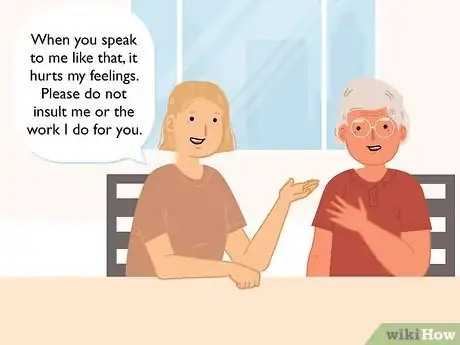This article was co-authored by Tasha Rube, LMSW. Tasha Rube is a Licensed Social Worker based in Kansas City, Kansas. Tasha is affiliated with the Dwight D. Eisenhower VA Medical Center in Leavenworth, Kansas. She received her Masters of Social Work (MSW) from the University of Missouri in 2014.
This article has been viewed 35,028 times.
Some older adults may lose their inhibitory abilities as they age and may not realize their comments are rude, crude, or outlandish.[1] Dealing with a relative who has lost their filter can be embarrassing, frustrating, and sometimes even hurtful. You might struggle with how to respond or handle your relative’s behavior. If you’re with your relative, find a distraction or redirect their attention. Don’t take their words personally if they say something outrageous or offensive. If you think the remarks may be related to health or cognitive ability changes, see a physician.
Steps
Responding Gently and Sensitively
-
1Respond to the remarks. You might be shocked or surprised to hear your relative saying something outrageous or crude. When your relative loses their filter, don’t react in shock, anger, or even ridicule. Gently let your relative know that their behavior is inappropriate and move on. There’s no need to bring up an incident once it has passed and you’ve dealt with it in the moment.
- For example, say, “It’s not appropriate to speak of people in that way. We do not talk like this.”
- In some cases, it may even be appropriate to ignore the comment and not respond at all. However, this may not be a good strategy for someone who is suffering from a cognitive decline.
-
2Guide them away. If the situation is uncomfortable, gently guide your relative somewhere else. Speak calmly and directly to your relative as you travel elsewhere. You may also notice certain situations that target their inappropriate behavior and divert their attention prior to them seeing something or someone.
- If you know your relative has a tendency to say inappropriate things during certain events or situations (like being in a large crowd or around young children), guide them away ahead of time to prevent the situation from unfolding.
- For example, if your relative is saying something racist while at the grocery store, direct them to a different aisle or exit the store.
Advertisement -
3Take a small break. If you’re feeling like the stress of dealing with your older relative is getting to be too great, take a quick break to de-escalate. Take a walk or go outside and get some fresh air. If you’re getting frustrated with your relative or need some time to cool off, remove yourself from the situation temporarily.[2]
- Excuse yourself from the room and go somewhere else. You may wish to prepare a snack to help you get away and return later.
-
4Respond to onlookers. Relatives have a way of saying things when others are nearby. It’s up to you how you handle the situation. You can apologize for their behavior (“I’m so sorry my aunt said that to you”), clue them in, (“Sometimes my grandmother says inappropriate things due to her dementia”), or laugh it off (“All those years of embarrassing my uncle as a kid have come back on me!”). However you choose to handle the situation, think about what your relative would want.
- For example, if your relative has always valued privacy, they may not appreciate you saying things about their condition to strangers. However, if your relative has often valued humor and lighthearted joking, consider taking the statements in stride when out in public.
Using Distraction and Redirection
-
1Redirect attention. If your relative is going on and on about something offensive or inappropriate, move their attention to something else. You may want to change the subject or have them look at something. Come to them with some photos or change the subject to a topic that interests them. Say something funny or introduce a joke.[3]
- Say, “That’s enough, let’s look at photos of the grandchildren.”
- You can also say, “Oh, I heard a funny joke yesterday. Would you like to hear it?”
-
2Use touch or other sensations. One way to redirect attention can be through touch. Especially if your relative is shouting, yelling, or screaming, they may be having difficulty expressing how they feel. They may be in pain or feel uncomfortable. Use a light touch to help calm them and help them feel safe.
- You may want to offer a small treat to help them feel safe and to enjoy something. This can include toffee or some small candy that your loved one enjoys.
- You can even incorporate their sense of smell, such as by placing some essential oils in an oil infuser. Try using a calming scent like lavender or rose oil.
- Colors and lighting can also be calming as well. Try using soft colors and dim lighting to create a calm atmosphere in the person’s room.
-
3Distract them with a familiar activity. Guide them to something they can do unassisted or that they feel independent doing, such as coloring or playing with the dog. The activity should be familiar and recognized by your relative, not a new or complicated activity.
- Say, “We’re going on a walk now, would you like to join?” You can also say, “Let’s put the dishes away.”
- If in private, place a soft object in their hand that they can throw without hurting someone. Often, people will divert their focus onto the object and away from their words. Consider using a small stuffed animal or a soft ball.
- If in public, talk about something your relative enjoys discussing. Say, “I’d like to bake a dessert when we get home. What should we bake?”
Handling Ongoing Problems
-
1See a medical professional. Sometimes a secondary condition may be responsible for odd behaviors. Certain health or mental diagnoses can cause problems, or medications may interact with your relative’s behavior. See a physician to rule out any problems related to health that can influence their behavior.
- Let the physician know that your relative’s behavior has changed and how it has changed. Note how long the behaviors have existed and if they appear to be linked to any changes regarding their health.
- Often, changes to personality and behavior can be an indication of Alzheimer’s disease or dementia.[4] Look for other indicators such as memory loss, decline in the ability to solve problems, confusion with time or locations, and changes in personality or mood.[5]
-
2Identify dangerous behaviors. It is important to know what to look for to keep your elderly loved one safe. Some warning signs that they might need professional help include:
- Changes in their body language. For example, the person may change their posture, their gestures, the physical distance between themselves and people they are talking with, their facial expressions, or tone of voice. Watch for any significant changes in the person’s body language.
- Environmental factors. Consider whether they are different in one environment or around certain people. Does removing them from the environment help? Does incorporating soothing scents, sounds, or colors help?
- Not getting basic needs met. Consider whether their basic needs are being met. Are they cold, hot, hungry, thirsty, or in pain?
- Changes in communication/behavior after a medical diagnosis. If this person has dementia or Alzheimer’s, consider whether they were able to express certain things to you before, but they are not able to do so now. How did they behave before? What was their behavioral baseline before you noticed this change? Did anything help them or make matters worse?
-
3Seek professional help for dangerous behaviors. If your relative’s behavior becomes increasingly out of control, you may start to feel uncomfortable or unsafe. If words or behaviors become abusive or dangerous, seek outside help from a therapist or other behavioral specialist. You may need to consider ways to feel safer or talk about ways to calm your relative’s anger. A home health nurse can help, as elderly people tend to be harsher with family and not strangers.[6]
- A therapist can work with you and your family to help find strategies to cope more effectively.
-
4Don’t take it personally. Your relative’s words may embarrass you or really hurt you. It’s hard not to take things personally, but keep in mind it is likely not their intention to hurt you or embarrass you. Focus on positive things and less on the negatives. If you do become upset, excuse yourself and spend some time removed from the situation.[7]
- Especially if the behavior is new and out of character for your relative, do your best to say to yourself, “These words are hurtful, but do not reflect how my relative feels about me.”
-
5Talk about the behavior. If your relative’s words or behaviors make you upset or uncomfortable, consider talking to them about it.[8] Let them know that their words are inappropriate or unkind. Say, “When you speak to me like that, it hurts my feelings. Please do not insult me or the work I do for you.”
- If talking gets you nowhere, decrease the activities you do for them. This can send the message of “treat me nicely and with kindness and I will continue to graciously help you.”
References
- ↑ https://consumer.healthday.com/senior-citizen-information-31/misc-aging-news-10/aging-brain-drives-blunt-behavior-and-missed-memories-528008.html
- ↑ https://www.agingcare.com/articles/bad-behavior-by-elderly-parents-138673.htm
- ↑ https://www.agingcare.com/articles/bad-behavior-by-elderly-parents-138673.htm
- ↑ https://www.agingcare.com/articles/bad-behavior-by-elderly-parents-138673.htm
- ↑ http://www.mayoclinic.org/diseases-conditions/alzheimers-disease/expert-blog/warning-signs-of-alzheimers/bgp-20055898
- ↑ https://www.agingcare.com/articles/bad-behavior-by-elderly-parents-138673.htm
- ↑ https://www.agingcare.com/articles/bad-behavior-by-elderly-parents-138673.htm
- ↑ https://www.agingcare.com/articles/bad-behavior-by-elderly-parents-138673.htm







































































